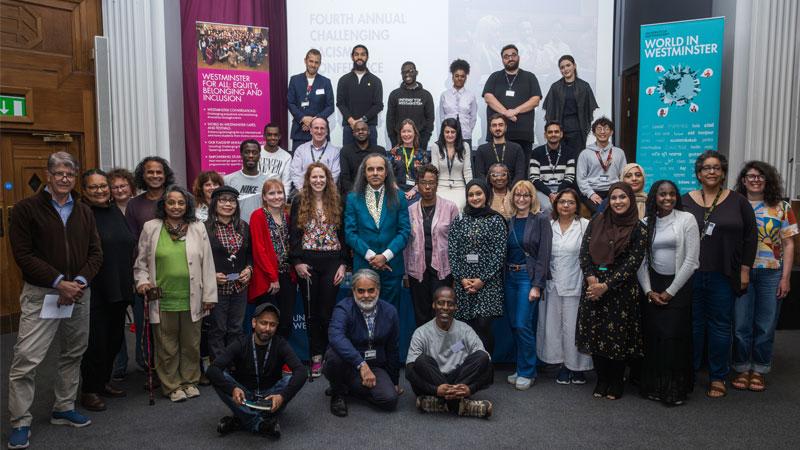The University of Westminster recently held the fourth annual Westminster Conversations’ Challenging Racisms Conference, bringing together experts, students, colleagues and the community for a day of panel discussions and workshops focused on tackling multiple forms of racism within and beyond academia.

Taking place on 8 May, the conference was organised by Westminster colleagues Dr Deborah Husbands, Reader in Race and Sociocultural Psychology, Professor Dibyesh Anand, Deputy Vice-Chancellor for Global Engagement and Employability, and Vice-Chancellor and President Professor Peter Bonfield. The event was part of the Westminster Conversations series of the University’s Quintin Hogg Trust-funded equality, diversity and inclusion (EDI) programme Westminster for All.

From left to right: Professor Dibyesh Anand, Dr Deborah Husbands and Professor Peter Bonfield
Attendees were welcomed with opening addresses from the organisers, who spoke about the University’s Being Westminster 2022-2029 strategic commitment to EDI and the importance of fighting injustice. The day’s events then kicked off with a keynote speech from the Vice-Chancellor of Birmingham City University Professor David Mba who spoke about this year’s theme, The Universals of Identity: Sameness and Difference.

Keynote speech
Throughout the day there were a variety of panel events and presentations on topics related to race and identity. First was a panel titled Reclaiming Identity: Women, Silencing and the Enduring Impact of Racism, which explored the way in which racism intersects with gender to shape women’s experiences of identity, voice and visibility, and was chaired by Sobia Razzaq, Senior Lecturer in Law and Co-chair of the Women of Westminster colleague network, and Stephen Bunbury, Reader in Law and Co-chair of the Black and Minority Ethnic (BME) colleague network. The interdisciplinary panel also featured Dr Shabna Begum, CEO of the Runnymede Trust, Dr Zahira Jaser from the University of Sussex Business School, and Nova Reid, writer and TED Talk speaker.
This was followed by a presentation on the Fluidity of Categories in Contemporary Racism by Rabbi Michael Pollak and Noam Weingarten, Senior Lecturer in Computer Science at Westminster, which explored how rigid belief systems can lead to intolerance.
After a networking lunch, attendees heard a panel discussion titled Anti-Racism and Antisemitism: Jewish Identity and Difference in Academia and Beyond, which started a conversation on unity and difference. Rabbi Gavin Broder, Professor Rosa Freedman from the University of Reading and Professor Anand made up the panel and discussed the challenges of exclusion faced by Jewish students and colleagues in the sector in recent years as well as positive examples in some universities.
Co-Chairs of the Westminster Colleague Disability Network Dr Claire Robertson and Daniela de Silva then ran a workshop on Race, Ableism and Identity. Attendees explored race and ableism through interactive scenarios on recruitment, neurodiversity and disability, before engaging in group discussions to reflect on the challenges they have faced and share their inclusive solutions.
The final panel discussion focused on Challenging Islamophobia and Building Belonging for Muslim Students which examined manifestations of Islamophobia for Muslim students in the Higher Education sector. The talk highlighted the importance of fostering belonging and inclusive institutional practices and policies within universities to ensure students and colleagues are supported. The panel consisted of Yusuf Kaplan, Interfaith Advisor on the Faith and Spirituality team at the University of Westminster, Dr Maisha Islam from the University of Southampton and Professor Anand.
Dr Husbands and Professor Anand concluded the session with closing remarks, before attendees enjoyed a networking drinks session to reflect on the day’s discussions.
About the event Dr Husbands said: “Our topic, the Universals of Identity, set the scene for a day of provocations and interesting but challenging conversations. The theme of trust—for ourselves, in our colleagues and in our institutions—emerged from the keynote presentation and framed the day’s sessions, where trust became the embodied experience of being in a brave space. The conference was a platform of solidarity and support for the extremity of lived experiences, often constrained by circumstances of dire conflict and oppression. Yet, we were able to see the possibility of a brighter future when we can stand together, united against all forms of oppression. I left the conference with the assurance that I am part of a larger movement that is committed to seeing positive change.”
Rabbi Polak added: “Once again the University of Westminster has succeeded in bringing diverse voices together in recognising that to challenge racism we need to stand together in fighting for justice and thus promoting unity over our particular injustices. This achievement by the University is sadly rare but nonetheless an inspiration which others should follow.”
Professor Anand concluded: “Challenging prejudices and celebrating diversities go together. A lot of emotional and intellectual labour is involved in holding these events and antiracist space can sometimes unhelpfully turn divisive rather than one where respect for different views and solidarity with all is valued. Yet, what the conference this year did was renew our commitment to keep going on. Building an antiracist university sector and contributing to a society without injustices is our mission. We may not get it right all the time, but we will persist. We are immensely grateful to those who are part of our conversations and invite further partnership from those who share our mission.”
The Challenging Racisms Conference directly contributes to the United Nations Sustainable Development Goal (SDG) 10: Reduced Inequalities. Since 2019, the University of Westminster has used the SDGs holistically to frame strategic decisions to help students and colleagues fulfil their potential and contribute to a more sustainable, equitable and healthier society.
Find out more about equality, diversity and inclusion events at the University of Westminster.






